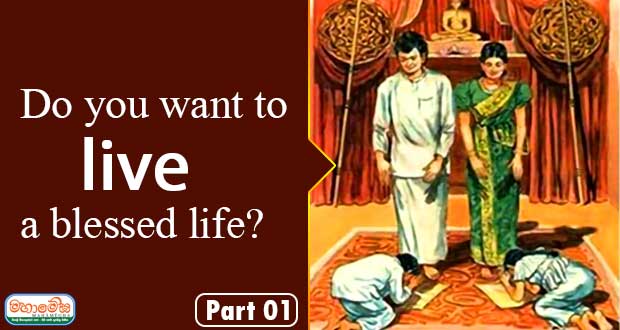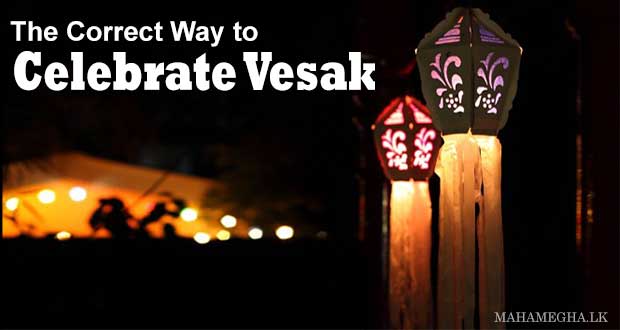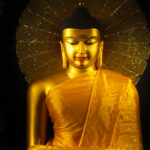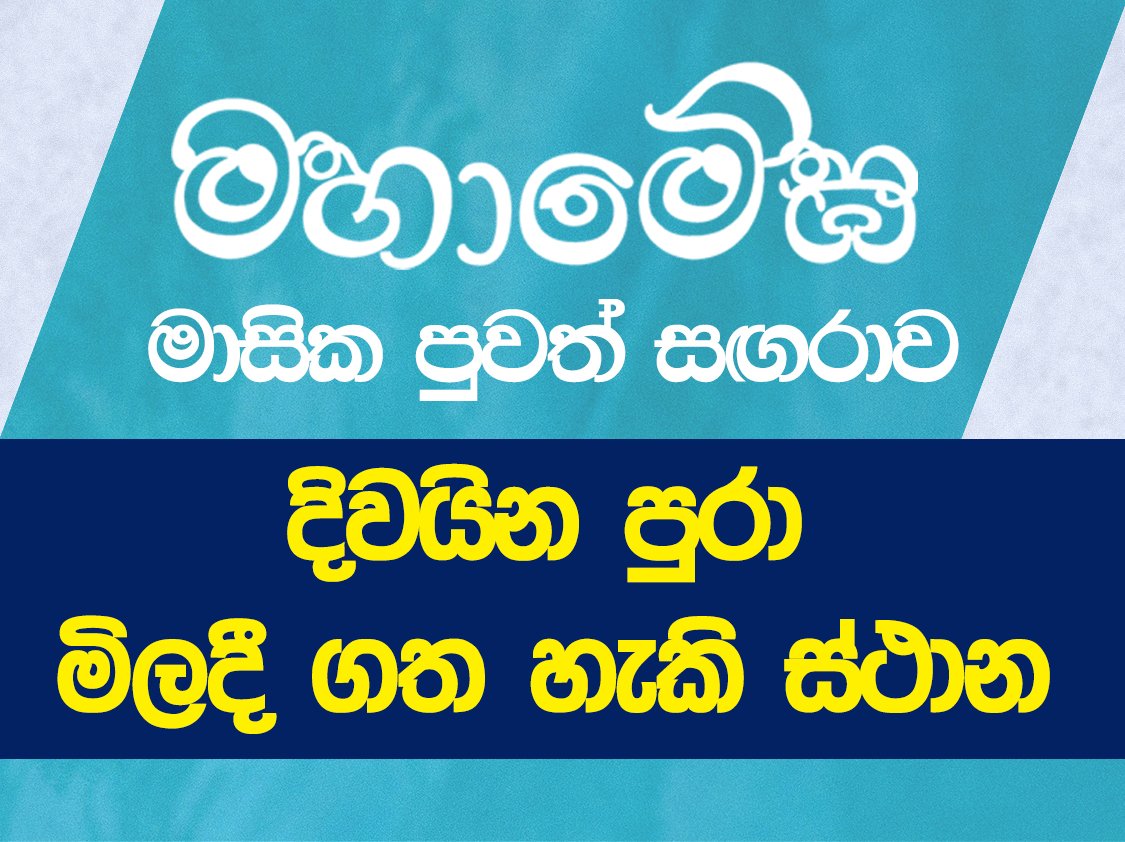What are blessings? ‘Blessings’ are generally understood as words or acts of well-wishers and it is more commonly associated with gods, spiritually developed people, parents, elders or friends. Another definition of ‘blessings’ is a beneficial thing for which one is grateful, such as a good family, wealth, health, beauty etc. When we look at both these general definitions, we see something in common. What is that? We see that both depend on outside sources.
This means ‘‘blessings’ are good things that happen to you not because of you, but because of other people and other things’. Does that mean to be blessed we need these outside sources, and our effort has no effect? That does not sound fair, does it? So, there must be something wrong about this general definition. What if we can make our own blessings by doing things? What if we do not have to depend on others and other things to be blessed? What if we can make showers of blessings upon ourselves regardless of time or day? Wouldn’t that be grand? Is it possible? Yes. In Maha Maṅgala Sutta, the supremely enlightened Buddha explicated 38 blessings that can be generated in our life, by ourselves, by our own actions.
During the time of the Lord Buddha, many gods had the problem of defining what blessings were. One day, a god came to Lord Buddha and asked Him to expound what blessings are to the world. At that moment the most compassionate teacher of humans and gods, Lord Buddha, expounded 38 blessings. It is called the Maha-Maṅgala Sutta. I am sure many of you are familiar with the Maha-Maṅgala Sutta since we recite that at home or we hear it on the radio in the mornings and nights.
The first stanza is uttered by the god, who asked the Lord Buddha to expound the ‘highest blessings’ as gods and humans have pondered on it for a long time in vain. From the second stanza, Lord Buddha explains what ‘blessings’ are. Let us learn them one by one.
1. Asevanā ca bālānaṁ – Not to associate with the foolish
2. Paṅḍitānañ ca sevanā – but to associate with the wise
These are the first two blessings said by the Lord Buddha. Who is a foolish person–bāla, and who is a wise person-paṅḍita, is explained in many suttas. Bāla is also called Asappurisa. He/she is a person who does not recognize what is wholesome and what is unwholesome, who does not know what is good and what is bad. This person engages in unwholesome actions and encourages you to do the same. The easiest way to recognize such a person is this: when you are with someone if your shame to do wrong vanishes, if your fear for the results of bad deeds vanishes, then you are with a foolish person, a bāla.
A wise person, a paṅḍitā is also called a Sappurisa, a noble-friend, a Kalyāna mitta. They never encourage you to do wrong things. In fact, they show you your short-comings and help you get on the right track. Once, venerable Ananda thero said that half of the Gautama Buddha’s dispensation depends on noble friends. At that moment, the Lord Buddha said, “No Ananda, you must not say that the whole dispensation depends on noble friends.” By associating with noble friends we learn what is right and what is wrong, we learn Dhamma and with the encouragement from the noble friend we start cultivating Dhamma in our lives. By disassociating from foolish people, we refrain from doing wrong things. Giving up wrong and embracing right is what happens when we chose to disassociate from foolish people and associate with the wise. And blessings start from that.
3. Pūjā ca pūjanīyānaṁ – honor those worthy of honor
Who are worthy of honor? Maha Sangha is worthy of honor: bhikkhu sangha and bhikkhuni sangha. Bhikkhuni sangha are no more in the world, but there are venerable nuns- Anagarika meniyo, who have left the lay life and gone forth as bhikkhuni sangha in the order of the Lord Buddha. How to honor them? We need to go see the venerable theros and nuns and pay respect. When we go to see them, they talk to us, they teach us the noble Dhamma and encourage us in the noble path. If we see them, talk to them and pay respect to them often, then we gain encouragement to practice the noble Dhamma. That is how honoring the noble ones become a blessing to our life.
4. Patirūpadesavāso ca – to reside in a suitable locality
What is a suitable locality? A place where noble Dhamma is accessible. A place where the Lord Buddha’s sacred relics are enshrined. A place where Bodhi trees are to be seen.
5. Pubbe ca katapuññatā – to have performed meritorious actions in the past
Having done meritorious actions in the past is a blessing and is essential to progress in the noble path. How to know if we have done meritorious actions in the path? If you are reading this article, that means you have met wise people, you live somewhere where noble Dhamma is taught and you are making an effort to learn more. That is a result of meritorious actions performed in the past. Most of us have an unfavorable habit of thinking ‘we have not done enough meritorious actions in the past.’ If you also think like that, well, ‘do it now’, because ‘now’ becomes the ‘past’ in the next moment. So observe and protect precepts now, meditate now, learn Dhamma now, be kind now and tomorrow you are a person with a meritorious past.
6. Attasammāpaṇīdhi ca – set oneself in the right direction
What is the right direction? It is the direction lead by noble Dhamma. Establishing in the noble Dhamma is a blessing that we can make possible to ourselves.
7. Bāhusaccañca – well educated in noble Dhamma
This means knowing noble Dhamma thoroughly. In Nagarupama sutta the Lord Buddha explains, just as many weapons are stored in a royal frontier fortress to fight back when enemies attack, we should have a stock of Dhamma to fight defilements when they arise. When we learn many suttas and remember a vast amount of noble Dhamma we can apply it in our daily life. For example, when we get angry, if we know how to get rid of it, according to Dhamma, we can do it. If we did not know how to tackle this deceiving mind, we get caught up in it and do wrong deeds by body, speech, and mind and accumulate a lot of bad kamma. Being well educated in noble Dhamma is not just a blessing that helps us in this life but a blessing that can liberate us from this dangerous sansaric journey.
8. Sippañca – knowledge of the arts and sciences
How does being skilled in the arts and sciences become a blessing? We can find a job easily, or be creative and innovative and begin our own enterprise. Also, our craftsmanship can be helpful in decorating or repairing our home, making things for our home on our own, rather than paying someone else to do it for you, and save a lot of trouble and money. Isn’t that a blessing?
9. Vinayo ca- well-grounded in the discipline
Conducting bodily actions and speech according to the way Lord Buddha said is what is meant by discipline. The complete teachings of Lord Buddha are divided into three sects: Sutra Pitaka, Vinaya Pitaka, and Abhidhamma Pitaka. Vinaya Pitaka includes all rules and guidance on discipline for the Sangha community. For lay people protecting precepts is the way of disciplining. Thus being well grounded in discipline is a blessing for both Bhikkhus and lay disciples.
10. Susikkhito – listening to advice and training according to the Dhamma
Listening to the advice of our noble teachers who teach the word of the Buddha and trying to adhere those and train accordingly is called susikkhito. Lord Buddha said, a person who has this quality welcomes advice heartily and tries to train accordingly. The great Arahant Rahula thero was named as the chief susikkhita disciple in the order. Even though Rahula was only seven when he became a novice monk, he was very eager to accept advice and was exceptionally cultured and obedient. Each morning he would rise and, taking a handful of sand, throw it up in the air saying, “Today may I receive from my fellow monks as much advice and instructions as these grains of sand.” So, if we can be humble to take advice from the noble teachers and elders, and try to train accordingly, we have the blessing of susikkhito in our lives.
11. Subhāsitā ca yā vācā – pleasant speech
What is pleasant speech? Speech that is not a lie, not divisive, not harsh and not pointless, is pleasant speech. If we surround ourselves with such speech, wouldn’t that be a great blessing? Every word of the Lord Buddha is pleasant speech. He did not speak for the sake of speaking. His words help us get rid of all that is bad; anger, jealousy, ill-will, envy, delusion, fear etc. and develop all that is good; kindness, patience, virtue, concentration, wisdom etc. And those words help gods and humans liberate from this sansaric journey. That is ‘Subhāsitā’. Be blessed with that!
12. Mātā Pitū upaṭṭhānaṁ – to support one’s mother and father
The highest support any son or a daughter can do to their mother and father is, help them, kindly, to establish in the noble Dhamma. Lord Buddha said a person can never pay the debt for his/her parents even if he/she looked after them by keeping them on his/her shoulders. So we should be ever so grateful to our parents and if they do not know the noble Dhamma, we should help them to learn and establish in it. That is a shower of blessings.
13. Puttadārassa saṅgaho – to provide for one’s wife and children
To support one’s wife and children is a blessing to one’s life. How should one support one’s wife and children? One should spend his earnings for the welfare of his wife and children, speak kindly to them and lead them on the right path by teaching them the Dhamma and treat them properly with equality.
14. Anākulā ca kammantā – to be engaged in peaceful occupations
Peaceful occupation means your work is not messed up. It is when you mix good deeds with bad deeds, mix merits with demerits that your work gets messed up and you lose your peace of mind due to the guilty conscious. Because most of us sometimes do good deeds and sometimes do bad deeds. Then it does not become peaceful. When one’s life is devoid of bad deeds and there remains only good, it is anākula; not messed up. By choosing to do good only, we can open our lives to this blessing.
15. Dānañca – Generosity
Being able to give is such a blessing in one’s life because not everyone can do it. In Sri Lanka, we have an immense opportunity to make this blessing a part of our lives. Buddha advised that you should give to whomever you are happy to give and also emphasized that giving to the Maha Sangha yields the most benefits. Nowadays we have the opportunity to give to the venerable Maha Sangha, also we can give to the needy, beggars or even animals and accrue many merits.
16. Dhammacariyā ca – righteous conduct
Righteous conduct is living according to the noble Dhamma.
17. Ñātakānañ ca saṅgaho – to help one’s relatives
Treating our relatives well is another blessing proclaimed by Lord Buddha. How should we treat our relatives? We must see to their needs, use nice words when talking to them, encourage them to lead a righteous life based on Dhamma and treat them with equality.
18. Anavajjāni kammāni – to be blameless in actions
If you are a virtuous person who upholds the precepts then your actions either by body or speech would be blameless.
In this article, we discussed 18 of the 38 blessings expounded by Lord Buddha in Maha Maṅgala Sutta. When we look at each blessing, briefly as done here, we can see that these are things we need to do. Blessings are evoked by doing things not by playing the sutta on the radio or even reciting. Therefore, let us learn the meaning of each blessing, spend some time thinking about the meaning until we remember it and try to apply them in daily life. And next time we recite the sutta, let us recite meaningfully. Remember, only if you remember the Dhamma you can apply it.
In next month magazine, we will learn the remaining 20 blessings.
Written by
Prajapathi Jayawardena














Recent Comments